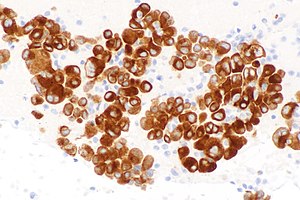Difference between revisions of "ROS1-rearranged non-small cell lung carcinoma"
Jump to navigation
Jump to search
| (4 intermediate revisions by the same user not shown) | |||
| Line 3: | Line 3: | ||
==General== | ==General== | ||
*ROS1-rearrangements are seen in approximately 1-2% of [[non-small cell carcinoma]].<ref name=pmid31720561>{{cite journal | | *ROS1-rearrangements are seen in approximately 1-2% of [[non-small cell carcinoma]].<ref name=pmid31720561>{{cite journal |authors=Patil T, Simons E, Mushtaq R, Pacheco JM, Doebele RC, Bowles DW |title=Targeted therapies for ROS1-rearranged non-small cell lung cancer |journal=Drugs Today |volume=55 |issue=10 |pages=641–652 |date=October 2019 |pmid=31720561 |doi=10.1358/dot.2019.55.10.3030646 |url=}}</ref> | ||
*Respond to | *Respond to targeted therapy, e.g. [[crizotinib]].<ref name=pmid30980071>{{cite journal |authors=Shaw AT, Riely GJ, Bang YJ, Kim DW, Camidge DR, Solomon BJ, Varella-Garcia M, Iafrate AJ, Shapiro GI, Usari T, Wang SC, Wilner KD, Clark JW, Ou SI |title=Crizotinib in ROS1-rearranged advanced non-small-cell lung cancer (NSCLC): updated results, including overall survival, from PROFILE 1001 |journal=Ann. Oncol. |volume=30 |issue=7 |pages=1121–1126 |date=July 2019 |pmid=30980071 |pmc=6637370 |doi=10.1093/annonc/mdz131 |url=}}</ref> | ||
==Microscopic== | ==Microscopic== | ||
| Line 13: | Line 13: | ||
Note: | Note: | ||
*Most common pattern varies by specimen type:<ref name=pmid27648828>{{cite journal | | *Most common pattern varies by specimen type:<ref name=pmid27648828>{{cite journal |authors=Zhou J, Zhao J, Zheng J, Kong M, Sun K, Wang B, Chen X, Ding W, Zhou J |title=A Prediction Model for ROS1-Rearranged Lung Adenocarcinomas based on Histologic Features |journal=PLoS ONE |volume=11 |issue=9 |pages=e0161861 |date=2016 |pmid=27648828 |pmc=5029801 |doi=10.1371/journal.pone.0161861 |url=}}</ref> | ||
**Biopsy specimens: solid pattern most common. | **Biopsy specimens: solid pattern most common. | ||
**Resection specimens: acinar pattern most common. | **Resection specimens: acinar pattern most common. | ||
| Line 38: | Line 38: | ||
Image: Adenocarcinoma - ROS1 positive - ROS1 -- high mag.jpg | NSmCC - ROS1 -high mag. | Image: Adenocarcinoma - ROS1 positive - ROS1 -- high mag.jpg | NSmCC - ROS1 -high mag. | ||
</gallery> | </gallery> | ||
==Molecular== | |||
*ROS1 rearrangements can be demonstrated with dual-colour break apart [[FISH]] probes.<ref name=pmid27535289>{{cite journal |authors=Bubendorf L, Büttner R, Al-Dayel F, Dietel M, Elmberger G, Kerr K, López-Ríos F, Marchetti A, Öz B, Pauwels P, Penault-Llorca F, Rossi G, Ryška A, Thunnissen E |title=Testing for ROS1 in non-small cell lung cancer: a review with recommendations |journal=Virchows Arch. |volume=469 |issue=5 |pages=489–503 |date=November 2016 |pmid=27535289 |pmc=5082594 |doi=10.1007/s00428-016-2000-3 |url=}}</ref> | |||
==See also== | ==See also== | ||
Latest revision as of 20:25, 24 May 2020
ROS1-rearranged non-small cell lung carcinoma is a subtype of non-small cell lung carcinoma that can be treated with ALK inhibitors.[1]
General
- ROS1-rearrangements are seen in approximately 1-2% of non-small cell carcinoma.[2]
- Respond to targeted therapy, e.g. crizotinib.[3]
Microscopic
Features:
- Histology not definitive; however, predictive features are:[4]
Note:
- Most common pattern varies by specimen type:[4]
- Biopsy specimens: solid pattern most common.
- Resection specimens: acinar pattern most common.
Images
IHC
- ROS1 +ve.
Images
Molecular
See also
References
- ↑ Shaw, AT.; Ou, SH.; Bang, YJ.; Camidge, DR.; Solomon, BJ.; Salgia, R.; Riely, GJ.; Varella-Garcia, M. et al. (Nov 2014). "Crizotinib in ROS1-rearranged non-small-cell lung cancer.". N Engl J Med 371 (21): 1963-71. doi:10.1056/NEJMoa1406766. PMID 25264305.
- ↑ Patil T, Simons E, Mushtaq R, Pacheco JM, Doebele RC, Bowles DW (October 2019). "Targeted therapies for ROS1-rearranged non-small cell lung cancer". Drugs Today 55 (10): 641–652. doi:10.1358/dot.2019.55.10.3030646. PMID 31720561.
- ↑ Shaw AT, Riely GJ, Bang YJ, Kim DW, Camidge DR, Solomon BJ, Varella-Garcia M, Iafrate AJ, Shapiro GI, Usari T, Wang SC, Wilner KD, Clark JW, Ou SI (July 2019). "Crizotinib in ROS1-rearranged advanced non-small-cell lung cancer (NSCLC): updated results, including overall survival, from PROFILE 1001". Ann. Oncol. 30 (7): 1121–1126. doi:10.1093/annonc/mdz131. PMC 6637370. PMID 30980071. https://www.ncbi.nlm.nih.gov/pmc/articles/PMC6637370/.
- ↑ 4.0 4.1 Zhou J, Zhao J, Zheng J, Kong M, Sun K, Wang B, Chen X, Ding W, Zhou J (2016). "A Prediction Model for ROS1-Rearranged Lung Adenocarcinomas based on Histologic Features". PLoS ONE 11 (9): e0161861. doi:10.1371/journal.pone.0161861. PMC 5029801. PMID 27648828. https://www.ncbi.nlm.nih.gov/pmc/articles/PMC5029801/.
- ↑ Bubendorf L, Büttner R, Al-Dayel F, Dietel M, Elmberger G, Kerr K, López-Ríos F, Marchetti A, Öz B, Pauwels P, Penault-Llorca F, Rossi G, Ryška A, Thunnissen E (November 2016). "Testing for ROS1 in non-small cell lung cancer: a review with recommendations". Virchows Arch. 469 (5): 489–503. doi:10.1007/s00428-016-2000-3. PMC 5082594. PMID 27535289. https://www.ncbi.nlm.nih.gov/pmc/articles/PMC5082594/.









